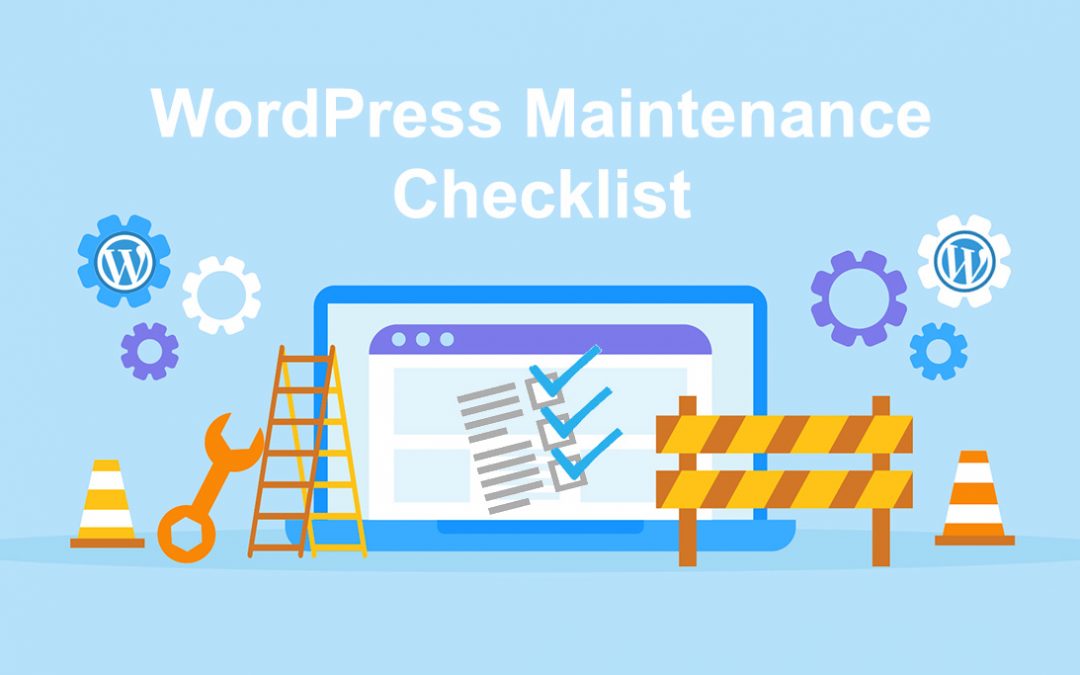The Ultimate WordPress Maintenance Checklist
Keeping your WordPress site healthy isn’t something you do once and forget about — it’s an ongoing routine. A well-maintained site runs faster, remains secure, and provides your visitors with a smooth and safe experience. You’ve likely invested a significant amount of time, energy, and money into your website, and maintaining it in good shape requires ongoing effort.
Here’s a practical WordPress Maintenance Checklist, broken down by how often you should tackle each task.
🗓️Daily Maintenance
These quick daily habits keep your site safe and tidy.
- Check if your site is online
Use tools like UptimeRobot or Jetpack to make sure your website hasn’t gone down without you knowing. - Keep an eye on comments
Approve genuine ones, delete the spam. Plugins like Akismet or Antispam Bee make this much easier. - Confirm backups are running
If your backups aren’t automated, make sure you do one every day. Plugins like UpdraftPlus, BlogVault, or your host’s backup tool work great.
🔁Weekly Maintenance
A little extra attention each week prevents bigger problems later.
- Update WordPress, themes, and plugins
Do updates regularly. Delete anything you don’t use to reduce security risks. - Test your website’s key pages
Visit important pages (like your homepage, contact form, or checkout) to make sure everything looks good and works properly. - Run a quick security scan
Tools like Wordfence, Sucuri, or iThemes Security can alert you to threats before they cause issues. - Check your analytics (SEO)
Look at traffic, bounce rate, and conversions with Google Analytics (or your preferred tool) to spot trends early.
📅Monthly Maintenance
Set aside time once a month for these deeper check-ins.
- Update WordPress core and database
Staying updated keeps your site secure and gives you access to the latest improvements. - Update your theme and plugin files
Outdated themes and plugins are a common security hole. Make sure everything is compatible with the current version of WordPress. - Double-check backups
Even if you run daily backups, confirm they’re stored safely and can be restored if needed. - Scan for viruses or malware
A quick scan with Wordfence or Sucuri gives you peace of mind. - Review your firewall and security settings
Ensure your firewall is active and doing its job. Services like Wordfence, Cloudflare, or Sucuri can help protect against attacks. - Do a full security scan
A deeper dive helps uncover vulnerabilities that a quick scan might otherwise miss. - Check file integrity
Make sure no files have been altered or tampered with. - Update your PHP version
Running the latest stable version makes your site faster, safer, and more compatible. - Check your domain and SSL
Confirm your domain registration is current and your SSL certificate hasn’t expired (expired SSL scares off visitors and hurts SEO). - Clear out spam comments
Even with spam filters, some junk slips through. Clean them up monthly. - Verify uptime monitoring
Make sure your monitoring tools (like UptimeRobot) are still active and alerting you if the site goes down.
🧹Quarterly Maintenance
Every few months, give your site a full “spring cleaning.”
- Test your forms and Calls to Action
Submit your own contact, signup, or checkout forms to confirm they work. - Review your hosting and SSL
Ask yourself: is your hosting plan still the right fit? Also, renew SSL certificates if they’re close to expiring. - Refresh old content
Update your best-performing posts and pages with new info, stats, or links. - Do a full site audit
Look for broken links, 404 errors, outdated plugins, or unnecessary redirects that may slow things down.
📦Annual Maintenance
Once a year, step back and look at the big picture.
- Renew domain name and licenses
Don’t let your domain, plugin, or theme licenses expire. - Evaluate your site’s design and goals
Is your site still mobile-friendly? Does it match your brand and business goals? If not, it might be time for an update. - Archive old data
Store a full backup offline or in cold storage (like an external drive or long-term cloud archive). - Clean up the media library
Delete unused images and files to free up space and keep things organized.
🛠️Handy Tools for Easier Maintenance
- Backups: UpdraftPlus, BlogVault, Jetpack
- Security: Wordfence, Sucuri, iThemes Security
- Performance: WP Rocket, LiteSpeed Cache, Asset CleanUp
- Monitoring: UptimeRobot, Google Search Console
- SEO: Yoast, Rank Math, SEOPress
👋Final Thoughts
WordPress maintenance doesn’t have to be overwhelming. A little regular care keeps your site safe, fast, and reliable — while improving user experience and SEO.
 Lu Myser
Lu Myser
With over 45 years of tech industry experience, Lu began in Silicon Valley’s early days, transitioning from technical support and product management to founding a software development firm. In 1990, he launched USBackbone, a wholesale internet company serving over 500 ISPs in North America. Today, Lu specializes in WordPress website design, SEO, and support, leading WP-ProSupport.com for WordPress owners nationwide and WP-ProDesign.com for cutting-edge AI-enhanced web development.


 Lu Myser
Lu Myser